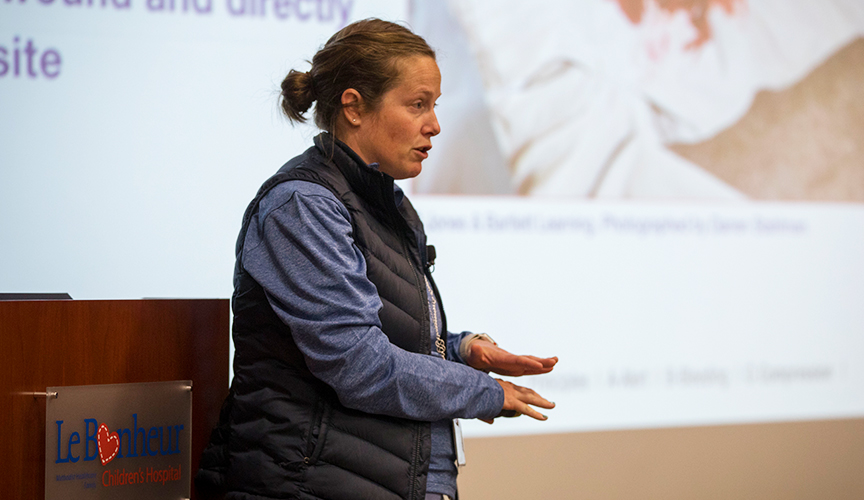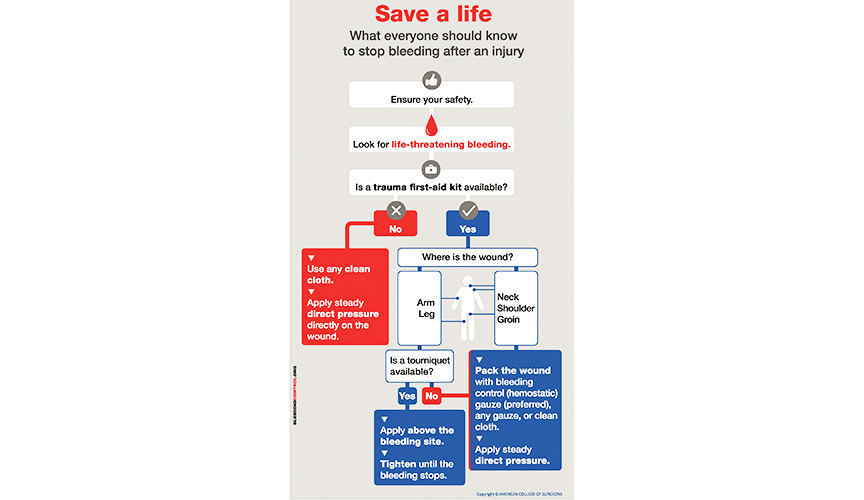Empowered to Act
In the wake of the 2012 Sandy Hook Elementary School mass shooting, physicians around the country identified an opportunity that could have provided life-saving measures to and improved outcomes of victims of that tragedy — training ordinary, non-medical members of the community to help someone who is bleeding profusely, no matter the cause. As a result, the American College of Surgeons developed the national program Stop the Bleed, which provides training to empower individuals around the country to help in a bleeding emergency until emergency medical services (EMS) can arrive.
Le Bonheur’s trauma team, led by Regan Williams, MD, medical director of Trauma Services, Anissa Cooper, MSN, RN, Trauma program director, Cheyenne Plesofsky, MPH, community violence advocacy fellow, and John Wright, EMS outreach coordinator, brings this training program to the people of Memphis. The Stop the Bleed training aims to help anyone with severe bleeding – from gunshot and knife wounds to ATV and automobile accidents.
“We really do need to empower public citizens to provide help when bleeding occurs,” said Williams. “It will help saves lives and at least gives the patient more time to get to the hospital.”

Medical Director of Trauma Services Regan Williams, MD, leads Stop the Bleed training. This program trains members of the community on how to help in a bleeding emergency.
In 2023 alone, Le Bonheur’s trauma team led 269 participants through Stop the Bleed training, with a focus on community organizations that address at-risk youth in areas of high violence in Memphis. Multiple times each year, the trauma team trains participants in the Shelby County Ceasefire Program, which comprises children 12 to 17 years old with a first-time gun charge and diverts them from the court system. The trauma team also trains staff members of the BLOC Squad, an intervention program that provides mentoring to at-risk youth, and embeds members in neighborhoods to interrupt the cycle of violence. In addition, the team has provided training at high schools, health fairs, apartment buildings and community events.
“For any type of injury with profuse bleeding, this training was put together to teach lay people life-changing techniques,” says Cooper.
Cooper expounds on the myriad benefits that are possible with this simple three-step training. Most importantly, when this training is properly applied, it can decrease the risk of serious blood loss, which means the individual arrives at the hospital with less severe blood loss and the possibility of a better outcome. Stop the Bleed techniques also provide time. Time for EMS to get to the scene and begin additional life-saving measures.
“Stop the Bleed is a great tool for people to feel empowered to do something,” said Plesofsky. “If something happened, here is what you could do that could help your neighbor.”

As a result of the training, Cooper has seen a sense of empowerment grow from within the trauma team and outward through the community. Cooper says the positivity in the team is contagious — team members have an eagerness to learn and share this education with the community.
And feedback from community members trained in the program is equally as encouraging. In fact, one woman trained through Le Bonheur’s Stop the Bleed informed the team that she was able to save a life thanks to the steps she learned. Plus, Cooper says that students trained in the program say they now feel confident about what to do if faced with a situation with heavy blood loss.
“Stop the Bleed training not only decreases the risk of catastrophic hemorrhage, but it means patients come to the hospital in less severe condition than if they didn’t receive these life-changing techniques,” says Cooper. “We are providing the community with techniques, teaching and training to be able to save somebody’s life.”
Help us provide the best care for kids.
Le Bonheur Children's Hospital depends on the generosity of friends like you to help us serve 250,000 children each year, regardless of their family’s ability to pay. Every gift helps us improve the lives of children.
Donate Now
















